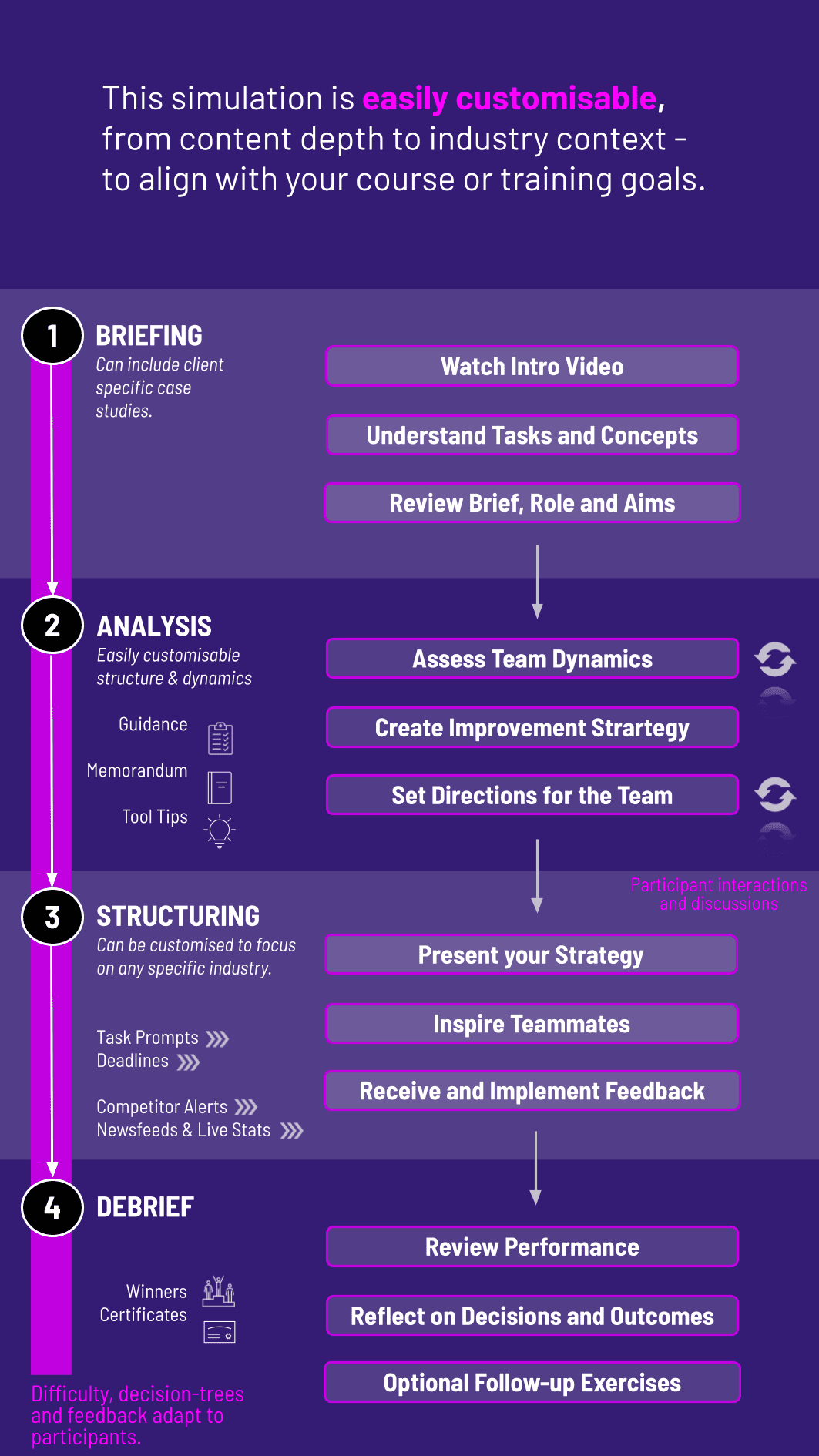
In this Ethical Leadership Simulation, participants act as organizational leaders facing ethical dilemmas, stakeholder conflicts, and high-pressure decisions - balancing integrity, performance, and long-term trust in complex business environments.
Ethical decision-making frameworks
Stakeholder management and moral trade-offs
Governance and accountability in leadership
Diversity, equity, and inclusion
Environmental and social responsibility
Communication and transparency
Whistleblowing and compliance reporting
Long-term trust vs short-term gain
Cultural and global perspectives on ethics
Leading with integrity in high-pressure contexts


Review case scenarios involving ethical conflicts
Debate trade-offs across financial, social, and governance perspectives
Make tough decisions under time pressure and uncertainty
Respond to whistleblower reports, media scrutiny, or regulatory changes
Communicate rationale through board memos, press statements, or team updates
Reflect on the long-term consequences of their actions
By the end of the simulation, participants will be able to:
Recognize and evaluate ethical dilemmas in leadership contexts
Balance competing stakeholder interests with fairness and responsibility
Apply ethical frameworks to complex decisions
Communicate transparently with integrity under pressure
Lead inclusively and responsibly in diverse environments
Build trust and credibility with stakeholders
Anticipate reputational risks from unethical behavior
Reflect on personal leadership values and biases
Foster a culture of integrity within teams and organizations
Adapt ethical leadership approaches to global and cultural contexts
The simulation’s flexible structure ensures that these objectives can be calibrated to match the depth, duration, and focus areas of each program, whether in higher education or corporate learning.
The simulation works in both individual and team settings and can be delivered in classrooms, corporate workshops, or executive programs. Each round represents an evolving ethical scenario.
1. Receive a Scenario or Brief: Participants receive a case with background, conflicting interests, and decision points.
2. Analyse the Situation: They examine the ethical, financial, and reputational implications of different actions.
3. Make Leadership Decisions: Participants select actions, policies, or communications to resolve dilemmas.
4. Collaborate or Debate: In teams, participants negotiate and defend their ethical positions to peers.
5. Communicate Outcomes: They justify decisions through memos, press releases, or board updates.
6. Review and Reflect: Feedback highlights organizational results, stakeholder trust, and reputational outcomes. Participants reflect on lessons learned.
Do participants need prior knowledge of ethics frameworks? No. The simulation introduces core ethical concepts as part of the gameplay.
Can this be customized for industries? Yes. Scenarios can reflect finance, tech, healthcare, energy, or other contexts.
Is this suitable for executives? Absolutely. It’s designed for emerging leaders and senior professionals alike.
Does it include cultural perspectives? Yes. Optional modules explore how ethics vary across regions and global contexts.
Can teams debate decisions? Yes. Team play encourages discussion, defense, and compromise on ethical positions.
How long does it run? It can run in 2-hour sessions or be expanded into multi-day workshops.
Does it include communication exercises? Yes. Participants prepare memos, statements, or board updates to justify their actions.
How is performance measured? By ethical consistency, stakeholder trust, and reflection - not by finding a single “right” answer.
Is it compatible with online learning? Yes. It can be delivered digitally, in-person, or hybrid.
Can universities use it in MBA programs? Yes. It’s an excellent fit for leadership, governance, or business ethics courses.
Consistency and clarity in ethical reasoning
Stakeholder balance and decision outcomes
Communication transparency under scrutiny
Adaptability in handling new developments
Peer/self-assessments capturing collaboration and reflection
You can also include memo writing and debrief presentations as part of the assessment structure. This flexibility allows the simulation to be easily integrated by professors as graded courses at universities and by HR at assessment centres at companies.
Join this 20-minute webinar, followed by a Q&A session, to immerse yourself in the simulation.
or
Book a 15-minute Zoom demo with one of our experts to explore how the simulation can benefit you.